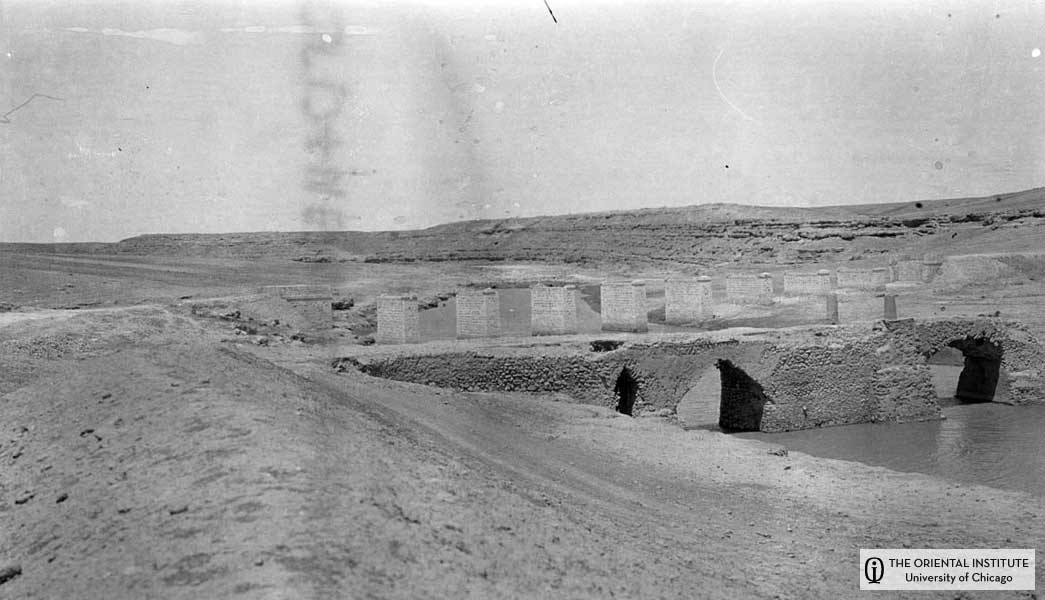House of Captain Shellswell, Political Officer, Anah, Upper Euphrates
May 2, 1920
You can’t imagine what a relief it has been to reach this beautiful, palm shaded village stretching nearly five miles as it struggles along the Euphrates filling entirely the narrow margin between the cliffs of the desert plateau and the shores of the river below, much as we have so often seen it in Nubia. The houses all about us are shattered and fallen, knocked down by the explosion of a huge ammunition dump placed here by the Turks and blown up by the British after their capture of the place. The ground all about is littered with large caliber shells ..
 Aneh: Turkish and Arab bridges located below the town; both destroyed. (N. 3764, P. 7324)
Aneh: Turkish and Arab bridges located below the town; both destroyed. (N. 3764, P. 7324)
Yesterday morning I put together the baggage in two lots, one which Luckenbill and I would take with us to Anah, and the other everything which was to be left with the boys. I planned to make a break with Luckenbill for this place and get additional transport to go back for the boys. I had been wondering all night what results might accrue from a telegram which I had written at once after the crippling of our second car, asking the Chief Officer at Anah to send us help. I sent it back to Hadîtha by our trustiest Indian driver. Just as we had got our three cars started after exasperating obstacles and delays, and Luckenbill and I were driving off to Anah, leaving the boys in the desert, we saw dust far down the road. A car at length emerged and I found in it as it approached a Sikh and a Ghurka with a good repair outfit. They said they had run out and repaired a car with a broken wheel and that it would be along in a few minutes. It was of course our derelict,—that is No.1. Sure enough as I looked eastward, I saw our car coming, accompanied by two Red Cross ambulances. In a quarter of an hour all our stuff was loaded, the boys sat each with the driver of a van, and we rolled off for Anah. A mile or two up the road, a fine looking young Englishman came along and greeted us cordially, asking me to take the vacant seat beside him in his smart-looking, special bodied Ford run-about. He was the transport officer from Hît, sent out to see that we got in. I rode very comfortably with him for the remaining 25 miles, and had a pleasant visit with him. We passed two long transverse lines of Turkish trenches, and a large masonry bridge over a wide deep wadi, which the Turks blew up as they retreated. We were obliged to ascend the wadi in a short detour in order to cross it.
Anah is nearly five miles long as I have already told you, and the straggling houses all along the way were many of them surmounted by a crooked pole mounted straight up on the roof. This pole had once carried a white flag, a token that the inhabitants of the house below were friendly, but in every case it had been carried away by the strong winds, and as a signal it was no longer necessary. As we drove into the fine looking serail, Captain Shellswell came out to greet us, and showed us rooms in the serail building, which is also his house. It was not yet lunch time.
After lunch Captain Shellswell and I drove up to the camp at the other end of the long village. He told me that he had been very anxious about us because he had been listening in on the telegraph wire which is also used for telephone and knowing the Morse code, had happened to hear my message calling for help. So it was the telegram which did the business. He said that raiding by hostile Arabs was still going on. Just two months ago there was a considerable battle between the Arabs and the British here. Shellswell and I went on to the camp and called on the commandant, Colonel Hardy, a Canadian. He kindly consented to send a telegram to the chief in Abu Kamal, asking for transport to fill up our gap. At the same time Captain Shellswell also sent one to Colonel Leachman, Political Officer at Abu Kamal, with a similar request. I then returned for some rest, fairly certain that we would be able to move the next (this) morning.
For the full story of my exciting trip you should come to the special exhibit “Pioneers to the Past: American Archaeologists in the Middle East, 1919-1920,” at the Oriental Institute!
1155 East 58th Street Chicago, IL 60637
Hours:
- Tuesday 10:00 am to 6:00 pm
- Wednesday 10:00 am to 8:30 pm
- Thursday 10:00 am to 6:00 pm
- Friday 10:00 am to 6:00 pm
- Saturday 10:00 am to 6:00 pm
- Sunday noon to 6:00 pm
- Closed Mondays
http://oi.uchicago.edu/museum/special/pioneer/
And visit me on facebook at: http://www.facebook.com/profile.php?id=3318774#/profile.php?v=info&ref=profile&id=100000555713577